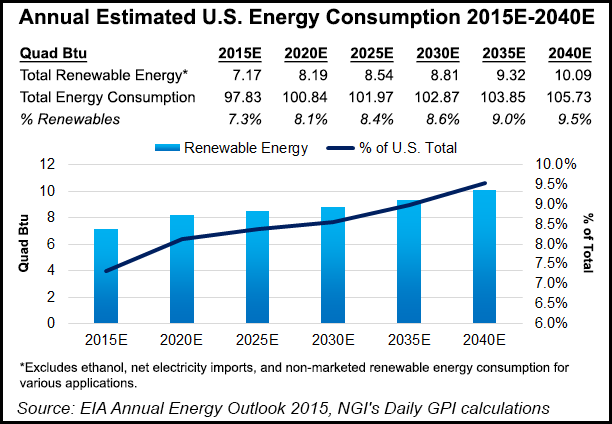Regulatory | NGI All News Access
Obama Initiatives Keep Administration Spotlight on Renewables, Distributed Energy
In a series of executive actions and in remarks by President Obama Monday, the administration kept tightened its focus on renewables and distributed energy, and described a United States increasingly less reliant on fossil fuels.

“For decades, our energy system basically worked one way: utilities generated power, usually by burning fossil fuels,” Obama said at the National Clean Energy Summit in Las Vegas. “They ran lines into the home or business. We paid for it. It wasn’t a real exciting business, there wasn’t a lot of innovation. We didn’t think about it much in our daily lives — until the energy bill came in the mail. And the economy grew under that model, at a time when we were less worried about dependence on foreign fuels, and at a time when we were less conscious about the impacts it was having on the environment.”
But in recent years, “that’s begun to change in a profound way,” with renewables grabbing a larger piece of the energy market, and an influx of smart meters and distributed energy technology giving consumers more control of the way they use energy.
“That’s power,” Obama said. “That’s the future. That’s happening right now. It’s an American energy revolution that’s like evolving from the telegraph to the smartphone in less than a decade. It’s happening fast…
“But while change this fast presents new opportunities, it is invariably going to create resistance from some fossil fuel interests who want to protect the old, outdated status quo. And there are some legitimate issues around how does a new distributed system work, and folks have some costs and how do we deal with those things, and those are important for us to address. But when you start seeing massive lobbying efforts backed by fossil fuel interests, or conservative think tanks, or the Koch brothers pushing for new laws to roll back renewable energy standards or prevent new clean energy businesses from succeeding — that’s a problem…this is about whether big polluters control the system, or whether consumers have freedom to choose cleaner, cheaper, more efficient energy; whether we protect old ways of doing business even when they’re not efficient, or we dream up new business models that bring new technologies into our homes and businesses, and new jobs into our communities. This is about the past versus the future.”
Earlier in the day, the White House announced a series of executive actions and private-sector commitments officials said would accelerate the country’s transition to cleaner energy sources and cut energy waste. Among them is the addition of $1 billion to the Department of Energy (DOE) loan guarantee authority for commercial-scale distributed energy projects. In addition, through the Advanced Research Projects Agency — Energy, DOE said it would award $24 million in funding for 11 high-performance solar power projects that could lower the cost and improve the performance of solar photovoltaic (PV) power systems.
The White House also said the administration was:
The initiatives are central to the Clean Power Plan that Obama introduced earlier this month (see Daily GPI, Aug. 3). The plan establishes for the first time federal limits on carbon emissions for the nation’s power plants, but apparently through the embrace of renewables, solar and wind power, rather than natural gas. It calls for the states to reduce emissions by 32% below 2005 levels by 2030.
© 2024 Natural Gas Intelligence. All rights reserved.
ISSN © 1532-1231 | ISSN © 2577-9877 |
